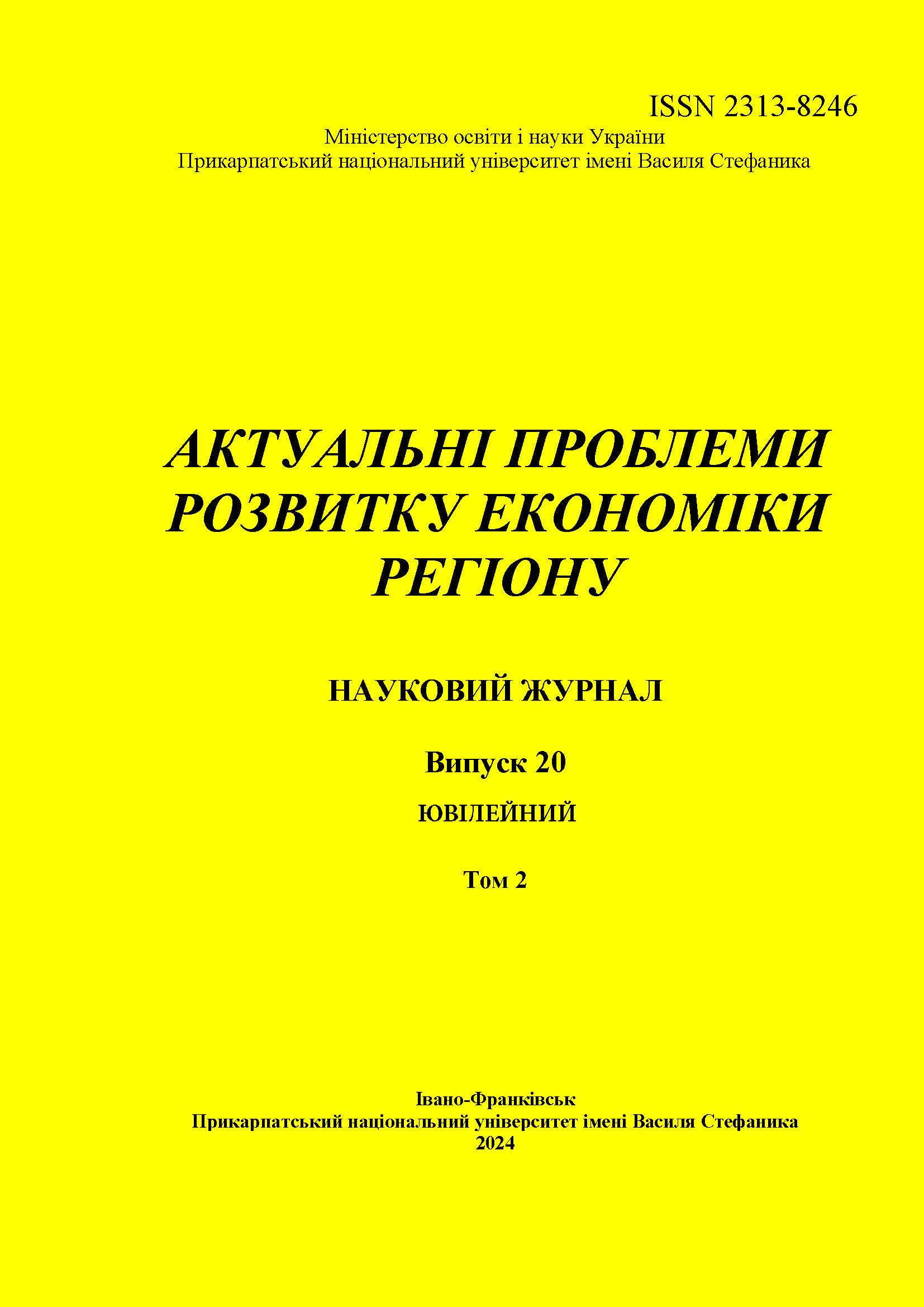STUDY OF FACTORS INFLUENCED ON THE MARKET OF HOTEL SERVICES IN MODERN CONDITIONS
DOI:
https://doi.org/10.15330/apred.2.20.222-231Keywords:
Ukrainian hotel services market, war, seasonal demand, hotel pricing strategy, ecotourism, target market segmentsAbstract
The war in Ukraine has presented unique challenges for various sectors of the economy, including tourism and the hotel business. The purpose of this study was to investigate the trends in the development of the hotel services market in Ukraine, its impact from the war, and the seasonality of demand in contemporary conditions. To achieve this goal, secondary marketing information was collected and analyzed, consumer survey results were conducted and analyzed, and observation methods were utilized. The results of the study allowed for a deeper understanding of the theoretical and methodological foundations regarding the application of synchro-marketing concepts in hotel operations, indicating the scientific novelty of the work.
The research revealed that the supply in Ukraine's hotel services market decreased during the war, with many establishments closed due to safety concerns, lack of demand, technical issues, or damage from shelling. Negative factors influencing demand for hotel services in Ukraine included a decrease in the population of Ukraine, the number of foreigners visiting, and initially, the cessation of domestic tourism, not considering displaced persons. From the beginning of the full-scale invasion until today, there has been a redistribution of Ukraine's hotel services market geographically. However, despite the full-scale war, hotels continue to remain attractive to investors. In addition to the war, seasonality continues to impact the researched hotel market. It remains a crucial factor in the hotel industry, affecting demand, pricing policies, and overall business effectiveness. Accordingly, hotels employ various marketing strategies to adapt to seasonal fluctuations and maximize revenue. One key strategy is pricing strategy. To compare the impact of seasonality on the hotel market in Lviv and Zakarpattia regions, a comparison of hotel prices in these regions during different periods of the year was conducted. The research showed that prices for accommodation in hotels unevenly increase during holidays, particularly in areas associated with ecotourism development. Considering seasonal demand, hotels can utilize other marketing tools besides seasonal discounts and offers, such as developing tailored offers for different target customer groups. The collected and analyzed primary marketing information demonstrates that even today, amidst war conditions, there are significant prospects for further development of Ukraine's hotel sector. It is critically important for hotel owners to select their locations wisely, formulate pricing policies, and continue to focus on these parameters in organizing their marketing communications to enhance their competitive positions. This underscores the practical value of the conducted research.
References
Bezruchko L., Bylous S., and M. Fil. “Hotel Industry of Ukraine in the Conditions of War: Current State and Development Prospects.” Economics and Society, no. 47, 2023, https://doi.org/10.32782/2524-0072/2023-47-43. Accessed 4 Mar. 2023
“Confident Development: Analysis of the Hotel Market in the Zakarpattia Region.” Pro-Consulting, pro-consulting.ua/ua/pressroom/uverennoe-razvitie-analiz-rynka-otelej-zakarpatskoj-oblasti. Accessed 26 Dec. 2023
Hayda, Yu.I., and Yu.R. Novak. “Features of Forecasting Demand for Hotel and Tourist Services.” Economic Analysis, volume 24, no.1, 2016, pp. 22-29.
Hosteva, S.P., Donchenko, L.M., and N.P. Rybalchenko. “Impact of Seasonality Factor on Tourism Demand Dynamics.” eprints.mdpu, eprints.mdpu.org.ua/id/eprint/2550/1/%D0%93%D0%BE%D1%81%D1%82%D0%B5%D0%B2%D0%B0.pdf. Accessed 26 Dec. 2023
Danilenko-Kulchytska, V.A. “Impact of War on the Hotel-Restaurant Business of Ukraine.” Tourism and Hospitality Industry in Central and Eastern Europe, no.6, 2023, pp. 19-23, https://doi.org/10.32782/tourismhospcee-6-3.
Dorosh, S. “Six Months of Russia's War against Ukraine in 10 Figures.” BBC, www.bbc.com/ukrainian/features-62610639 Accessed: 7 Mar. 2024
Lupashko, A. “The Situation of the Hotel Business during the War.” Economic Truth, www.epravda.com.ua/columns/2022/09/28/691984/. Accessed 26 Dec. 2023
Malska, M.P., and I.G. Padnyak. Hotel Business: Theory and Practice. Textbook. 2nd ed. Kyiv, Center for Educational Literature, 2012.
Malska, M.P., and I.G. Padnyak. Organization of Hotel Services. Kyiv, 2011.
Nikolyuk, O.V., Savchenko, T.V., and T.I. Nikitchina. “Features of Managing Innovative Technologies in Hospitality Enterprises.” Market Infrastructure, issue 64, 2022, pp. 48-53, https://doi.org/10.32843/infrastruct64-9
“Tourism Development Indicators.” city-adm.lviv, dashboard.city-adm.lviv.ua/kilkist_goteliv_ta_analogichnykh_zakladiv_rozmischennya. Accessed 4 Mar. 2024
Tymoshenko Z.I., Munin H.B., and V.P. Dyshlevyy. Marketing of the Hotel and Restaurant Business. Kyiv, European University, 2007.
Bernthal, R. “International Travel, Resorts & Hotels.” Travelwritersmagazine, www.travelwritersmagazine.com/ukraine-journal-hotel-businessin-ukraine-during-war-with-russia// Accessed 7 Mar. 2024
Booking.com, www.booking.com. Accessed 7 Mar. 2024
Downloads
Published
How to Cite
Issue
Section
License

This work is licensed under a Creative Commons Attribution-NonCommercial-NoDerivatives 4.0 International License.
- Authors retain copyright and grant the journal right of first publication with the work simultaneously licensed under a Creative Commons Attribution NonCommercial NoDerivs 4.0 Unported License that allows others to share the work with an acknowledgement of the work's authorship and initial publication in this journal.
- Authors are able to enter into separate, additional contractual arrangements for the non-exclusive distribution of the journal's published version of the work (e.g., post it to an institutional repository or publish it in a book), with an acknowledgement of its initial publication in this journal.
- Authors are permitted and encouraged to post their work online (e.g., in institutional repositories or on their website) prior to and during the submission process, as it can lead to productive exchanges, as well as earlier and greater citation of published work (See The Effect of Open Access)


